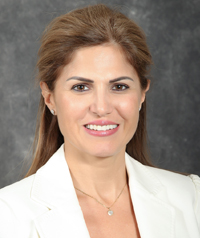
Vitae
Google Scholar Profile
Scholars@TAMU Profile
Dr. C. Silva Hamie is an Instructional Associate Professor in the Department of International Affairs (IA). She joined the Bush School in 2014, teaching courses on post-conflict recovery and development, clientelism and corruption, human trafficking, and international organizations. She also advises students and is involved in IA capstone projects. Her areas of research focus on approaches, methods, and new dynamics of development and human displacement.
A native of Lebanon, Dr. Hamie earned a BA in political science at Beirut University College, an MA in international relations at the Lebanese American University in Beirut, and a PhD in politics from the University of York in the United Kingdom.
After earning her doctorate, Dr. Hamie worked for Oxfam GB monitoring, analyzing, and reporting on humanitarian developments in heavily targeted areas during and after conflict, including in the Beirut suburbs, South Lebanon, and the Bekaa Valley. She provided updates on the evolving situation and drew attention to key policy issues. She also built a network with local and international NGOs, local governmental agencies, journalists, researchers, UN agencies, ministries, and politicians. The network was essential for acquiring and sharing relevant information. In addition, she initiated and integrated a “preparedness plan” while taking into account the updated political situation in Lebanon. From 2007 to 2010, Dr. Hamie was a Projects Manager at the United Nations Development Program in the Southern Suburbs of Beirut, where she managed the Poverty Reduction and Local Governance program after the July 2006 war in Lebanon.
Dr. Hamie has also served as a Program Specialist in the College of Education at the University of Georgia, where she developed an online master’s program in adult education designed for adult education leaders in Middle Eastern and North African countries.
Dr. Hamie has published extensively on Middle Eastern and post-conflict issues. Most recently, she coauthored a book chapter on the role of informal institutions in the interconnectedness between water-energy-food (WEF) nexus and migration. She’s also been a PI on a grant to conduct research on the relationship between the WEF nexus and migration.
